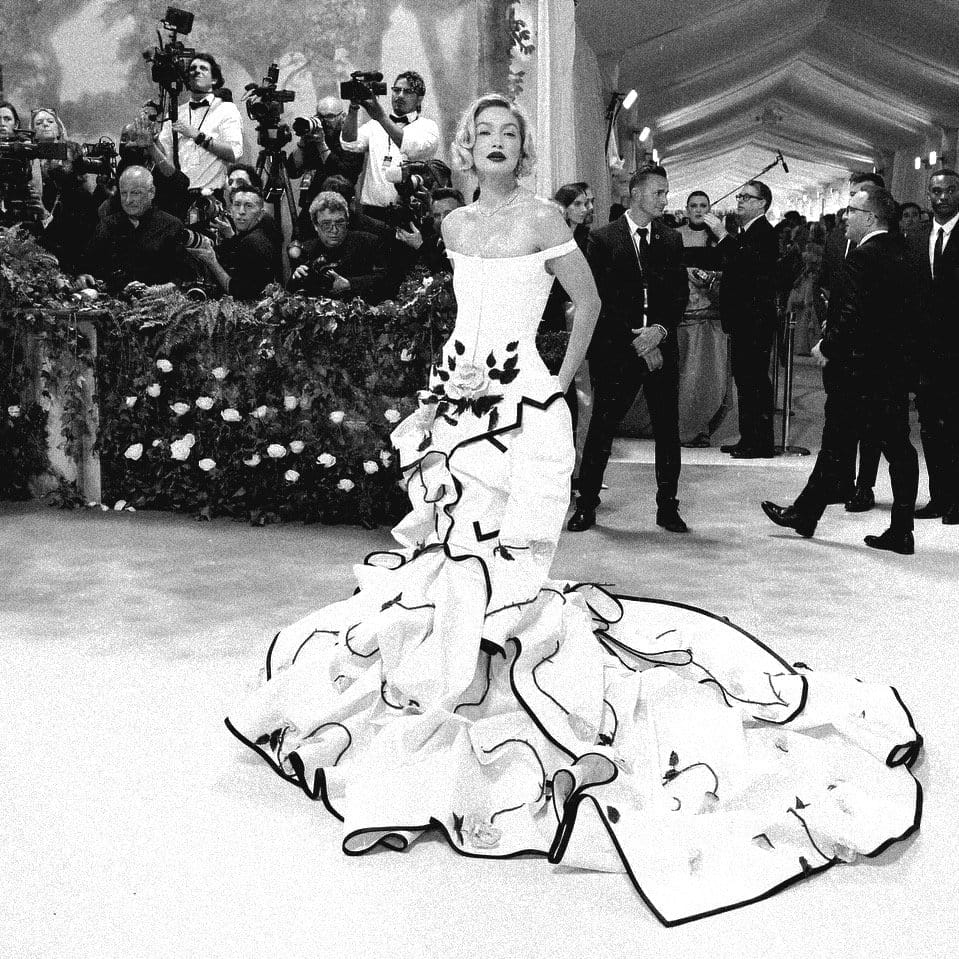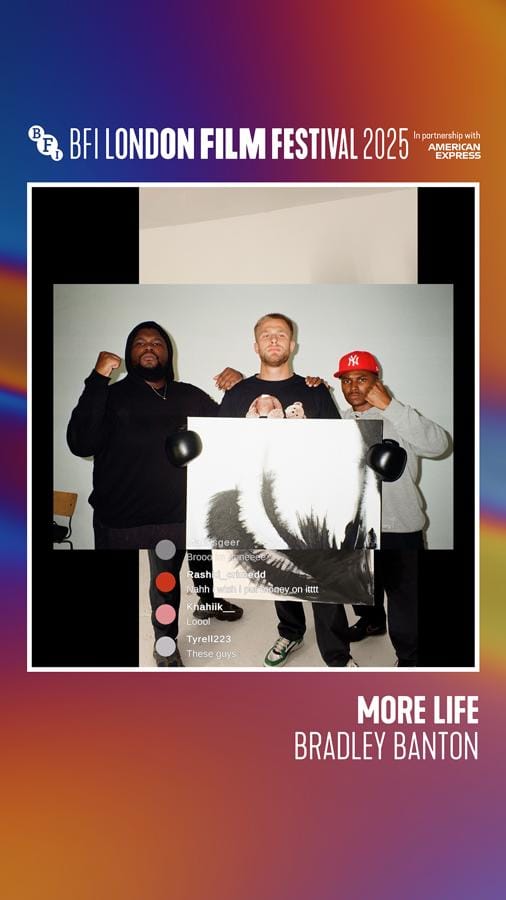The Met Gala “Digitine”: or, when Fashion falls short.


Preceding and then following the Met Gala this year, the justified fear of yet another glitzy culturally iconic event being used as cover for ramped up genocidal efforts by the Israeli Military soured the entire thing. Protestors were ‘successfully’ corralled away from the actual streets of the Gala, and the entire Monday was what sparked the Digitine movement - the “BlockParty 2024” - and comparisons were made to the Hunger Games (A book written based on our realities, not the other way around).
On the surface, it is easy to digest these events as cultural junk food - the passing white noise of the day, before the next outrageous contradicting thing. However - I want to dive deep into the nuances and further outrages we can have here, in a way I don’t think anyone has as of yet.
Met Gala History
If this is Fashion’s Superbowl, then it contains within it all the hallmarks and nuanced critiques one can expect from American Apple Pie-esque institutions in the modern age.
As much as some within the culture want to devalue the historically maligned artistic expression that is fashion, The Costume Institute has always done vital work preserving the designs, textiles, histories and knowledges of the Fashion Industry from communities across the globe.
Despite this, it holds within it as many biases as are present within their leadership - and often, frequently, misses the mark on showing up for true diverse, decolonised appreciation of the art form.
The Gala itself suffers the same nuanced faults - I remember being a vocal but anonymous voice online against Orientalism in 2015, and even more publicly furious at the Karl Lagerfeld Gala that failed wholesale to honor and cherish the memory of the recently departed André Leon Talley - who made it his career’s worj to uphold Anna Wintour’s Vogue as the premiere fashion publication of the world, and has largely been unspoken about at the Met since his passing (with notable exception, Colman Domingo - who just happens to be an exception in a lot of ways).
However, The Gala has, completely, become a cultural knighting ceremony, where stars are made and minted. Only recently has space been made for those stars to be of different body shapes, openly queer, or representing marginalised communities in authentic ways. This was due to cultural shifts alone - and if any woman in fashion is last to these types of shifts, it’s Anna Wintour. Which, of course, often puts her ahead of many other industries - giving the illusion that she is a kingmaker, and a progressive, for these moves.
I highly suggest you watch this video on the Met’s History.

The Event itself, 2024
Even the concept of the Gala has come into question, as it should - the exhibition is a ticketed event now, which means that now, both Ticket sales to the Exhibition and the Gala raise funds for the Institute. If all this money is truly needed for the archive, then this should be something subsidised by the Met itself - who, surely now, see the need for this institute. The contract requiring the Institute to fundraise for itself was established at a time where the Met didn’t see much value in the preservation and presentation of garments for the purposes of Fashion History, specifically. This must have changed by now, so the contract must be changed along with it.
If you do not see the utility of the Institute, perhaps consider that there are garments being preserved in the archive that prove the existence of Palestine, for one.
Also - please do interrogate your bias against fashion! As it is often an industry associated with women and queer people, and is often maligned for it's contribution, it can be easy to gloss over it as being frivolous, vapid or unneeded. However, we all wear clothes, and for those clothes to be sustainable and non-exploitative, they must be made by people, and their craft and labor respected. This, in no small part, is what the Costume Institute was built to do.
Whether it does it effectively is up for debate.
Furthermore - most Met Gala attendees do not pay for their own ticket - they are there as invitees for corporations. Almost all that money ‘per ticket’ is coming from companies like Meta, TikTok, LVMH and so on. Organised boycotts of those companies may end up resulting in us boycotting the Met Gala in the future, but this can only happen from a considered and focused place, where the decision would apply the most pressure.
Fashion always fumbles the bag.
I can proselytise all day about the value of Fashion, the potential of Fashion, but honestly, the industry has let us all down. Very few, if any, designers have made statements on Sudan, Palestine, Congo, Haiti etc. - they tend not to even make statements about exploitative practices up and down their own supply chain, including the exploitation of their own assistants and interns.
It took the downfall of multiple companies - Victoria’s Secret included - before High-End Luxury Fashion en-masse could even try to accept the beauty in bigger bodies - and one might argue they still haven’t.
Some Black and Brown faces have made it to high places, and some (like Edward Enninful) have done absolutely outstanding, barrier-breaking work, the kind that pisses a lot of entrenched people off - but some have not. Some simply fit into the current system and do very little to change it.
When it comes to the big ticket gatekeepers, designers, brands - there’s been very little change from the attitude of the 90’s, and very few up and coming brands from then until now seeking to break that system of thinking once and for all, for fear of not being able to find funding, I can only assume. Or, perhaps, the average Fashion customer is not the average person, so they simply keep catering to the upper echelons, and therefore maintain the circular logic.
What the industry seems to be able to stomach is little peace-meal changes, the kind that can be reversed if profits seem to look not so slightly as great as they thought. That’s all it takes. Fashion stays ahead by considering itself forecasters of the general sentiment, but only if that sentiment is based on what came before - and often, is actually not representative of the general sentiment, but simply the sentiment of their inner bubble.

I’m mad, i’m sad, and I know we can do better.
These groups of people can no longer co-opt subversion, ‘artistic representation’, or true boundary breaking anymore, if they are unable to see how they can and should be thinking differently. How they can using the platform of high fashion for political statements, finding beauty in a much wider array of customers, and converting even those unable to buy the clothes or the perfumes into people who will save up for pieces that are relevant to their lives and values.
As someone who considers herself a Fashion customer - someone who will save up for pieces, someone who believes fewer, better clothes is the chicest course of action - and wants a thriving, beautiful fashion industry to choose from, I feel my generation are left with very few, if any, statement makers. Very few innovators.
Innovators - people willing to break the dress form, break the sizing chart, and truly stand by the common adage that Fashion is Political and actually go for it, be political, get uninvited, be the vanguard everyone says they strive to be.
If the point of this industry is to clothe all people, to make clothes of quality, to democratise the form, to bring beauty to the body and to express artistic intent - this is inherently political work, and the industry may think it cannot afford to speak out, but at this rate, it cannot afford to be silent. My generation will simply divest, as they are already doing, into the secondhand market, and away from these brands to brands who do align with their values, and give up on the industry entirely.
Anyone seeking to be distruptive, the vanguard, to do something different - cannot be so scared of the balance sheet that they simply do not use the platform of the clothes to make a statement.
If we continue this way, the industry will die, and it will be the hypocrisy that killed it.
Now, how’s that for a trend forecast?





